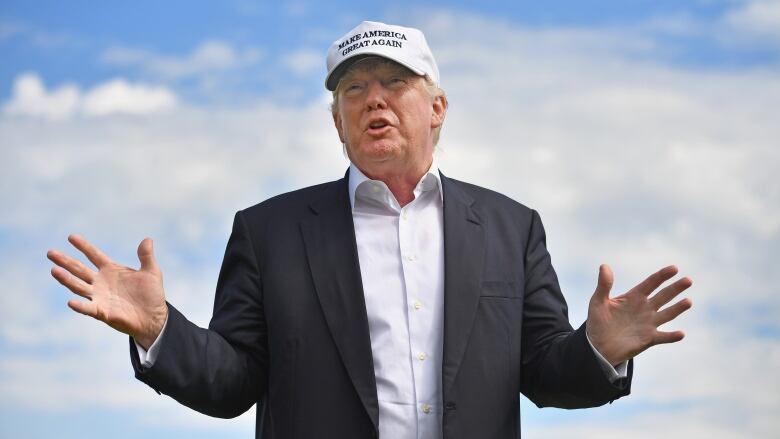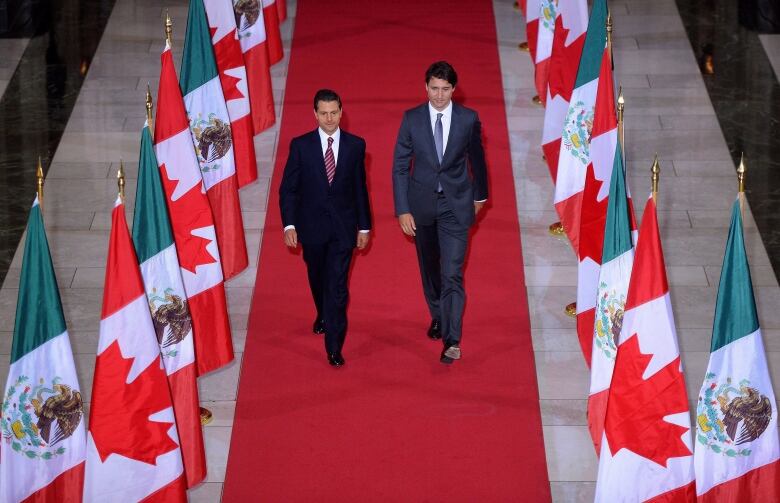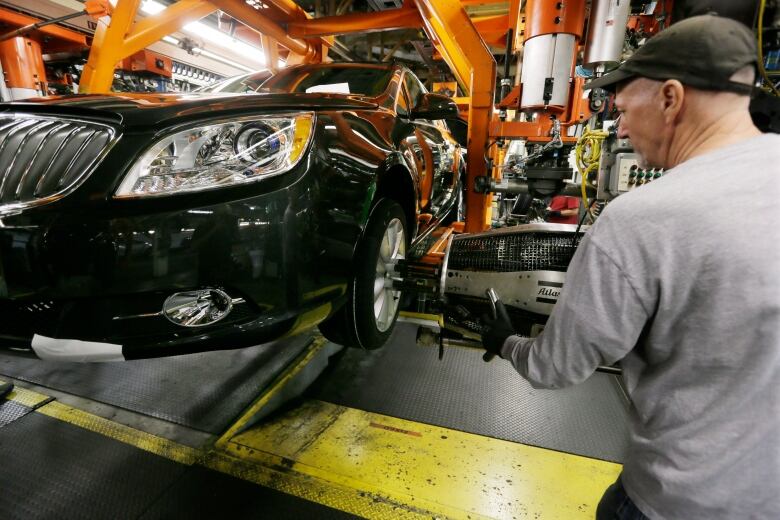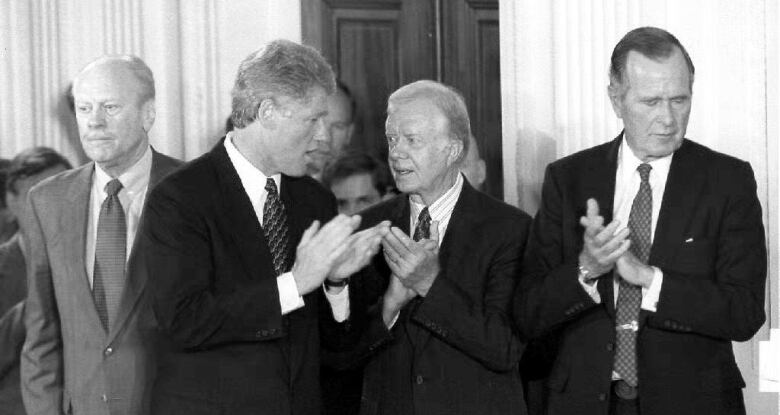Is Trump's tough talk on trade all bluster? Business leaders shouldn't wait to find out
A leaked memo suggests reopening NAFTA is at the top of Trump's priority list, but Canada isn't alarmed

Donald Trump's language during his successful presidential bid always bordered on incendiary, whether it was calling his opponent "Crooked Hillary" or dismissing climate change as a Chinese "hoax."
So it should be no surprise that the president-elect's choice of words when describing American trade deals resorted to the same excess, overkill and hyperbole.
"When was the last time anybody saw us beating, let's say, China in a trade deal? They kill us," Trump said in 2015.
"I think our current deals are a disaster," he offered in a television interview the same year.
- Canada, Mexico co-ordinated trade strategy after U.S. election result
- Trump claims credit for saving Ford jobs in U.S. not set to leave
- Renegotiating NAFTA will spark 'classic border skirmishes,' former BoC governor says
Trump's favourite rhetorical target, though, is the North American Free Trade Agreement.
"NAFTA is the worst trade deal maybe ever signed anywhere," he said during the first presidential debate in September, saying he would renegotiate the 23-year-old deal or scrap it.
Trump, of course, is now in a position to follow through on that promise as he continues the work of choosing his cabinet and identifying priorities for the new year. A leaked memo purporting to be from his transition team suggests reforming NAFTA will top the list.
The problem for Canada and Mexico is that Trump's election posturing, and his efforts to portray NAFTA as a job-bleeding, company-closing failure signed by Hillary Clinton's husband when he was president, is based on a combination of overstatement and misinformation.
For now, Canada isn't alarmed. Far from it.
'Naive move'
Prime Minister Justin Trudeau's already expressed a willingness to reopen NAFTA a statement that earned him an immediate rebuke from the Conservatives who argued he weakened Canada's bargaining position.
"It was an incredibly foolish and naive move on the part of the prime minister,'' Conservative House leader Candice Bergen told the Commons on Thursday.
"Although the president-elect has promised to tear up this important agreement, everyone knows his issues are with Mexico, not Canada. So why would the prime minister wave the white flag, say he would open up the agreement and put so many jobs in jeopardy?"

The government's response is that it's smarter to be proactive, especially when so much of what Trump has said, and the positions that he's taken during the campaign, lack real definition.
The truth is NAFTA has been modified a number of times over the past two decades to reflect changing realities. To do so again is hardly giving away the farm.
"The Canada-U.S. trade relationship is a success story," says Adam Taylor, an advisor to former Conservative trade minister Ed Fast, who now leads the trade practice at public affairs firm Ensight.
"Canadian and American businesses need to continue to show that it's a win-win on both sides of the border."
Multibillion-dollar relationship
The two countries exchange nearly $1.6 million in goods and services every minute. And in response to Trump's assertion that he wants trade deals that benefit American workers, nearly nine million jobs in the U.S. directly depend on trade and investment with Canada, according to the Canadian government.
Oh yeah. And Canada is the No. 1 trading partner of 35 U.S. states, ranging from Florida to Colorado to every single border state, with the exception of Washington.

But numbers and facts don't make for stirring rhetoric on a campaign trail.
"We lose with Canada. Big league. Tremendous, tremendous trade deficits with Canada," Trump told a rally in upstate New York last April.
The reality is this: The U.S. trade deficit with Canada was $15 billion in 2015. Not chump change, by any means, but as part of a nearly $600-billion trading relationship between the two countries, it's neither "tremendous" nor "big league."
Some of Trump's earliest supporters understand that.
Mary Taylor is the Republican lieutenant-governor of Ohio and a leading contender for the governor's office in 2018.
"We have to figure out and he has to figure out how how these types of trade relationships are in the best interest of the United States," she says in an interview on this week's podcast edition of The House.
The business community also has more work to do, on both sides of the border.
Deep integration
"Where I grew up in northeastern Ohio, NAFTA wasn't a four-letter word, but it was usually preceded or followed by one," says Dan Ujczo, president of the Ohio-Canada Business Association and a trade lawyer with the firm Dickinson Wright.
Ujczo says most Americans understand the importance of trade with Canada. They know how integrated the two economies are and that, in the auto industry and others, supply chains will not be easily broken.
Business and other leaders need to now step up and make that case, he says.
"The big mistake we made after NAFTA was we got the deal passed in '94 and everybody went home. They left the hall in Congress and went home and just said, 'Trade will prove itself.' Well, no. What we've learned is we've got to continue to get out there and talk about this."

Canadian officials are preparing to do just that.
The Trudeau government crafted a series of post-election scenarios including a Trump win with the Republicans retaining control of both houses of Congress that include ways to modernize NAFTA, from improved protection of intellectual property to making it easier for professionals to work in the three member countries.
Those plans will pick up once Trump's cabinet choices are made.
- What would it take for Donald Trump to rip up NAFTA?
- Baloney Meter: Is Donald Trump's anti-NAFTA rhetoric all about Mexico?
In the meantime, Canada continues trade talks with other countries, including Japan and other countries who signed the Trans-Pacific Partnership, in anticipation that Trump will carry through with his threat to withdraw support for the Pacific Rim trade pact.
And the prime minister will have a chance to exchange views with some of the other TPP leaders at this weekend's APEC summit in Peru a free trade of ideas in how to respond to a president-elect who promises to "make America great again" at the expense of its trading partners.












_(720p).jpg)


 OFFICIAL HD MUSIC VIDEO.jpg)
.jpg)



























































































